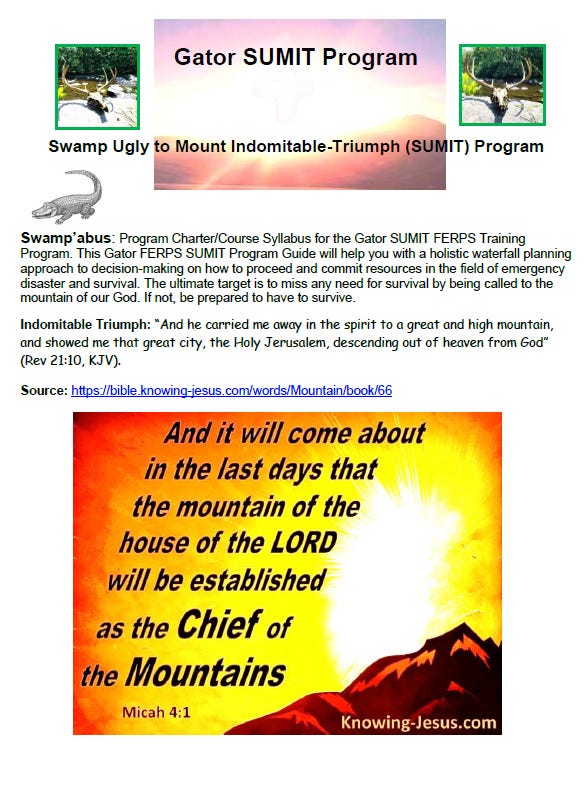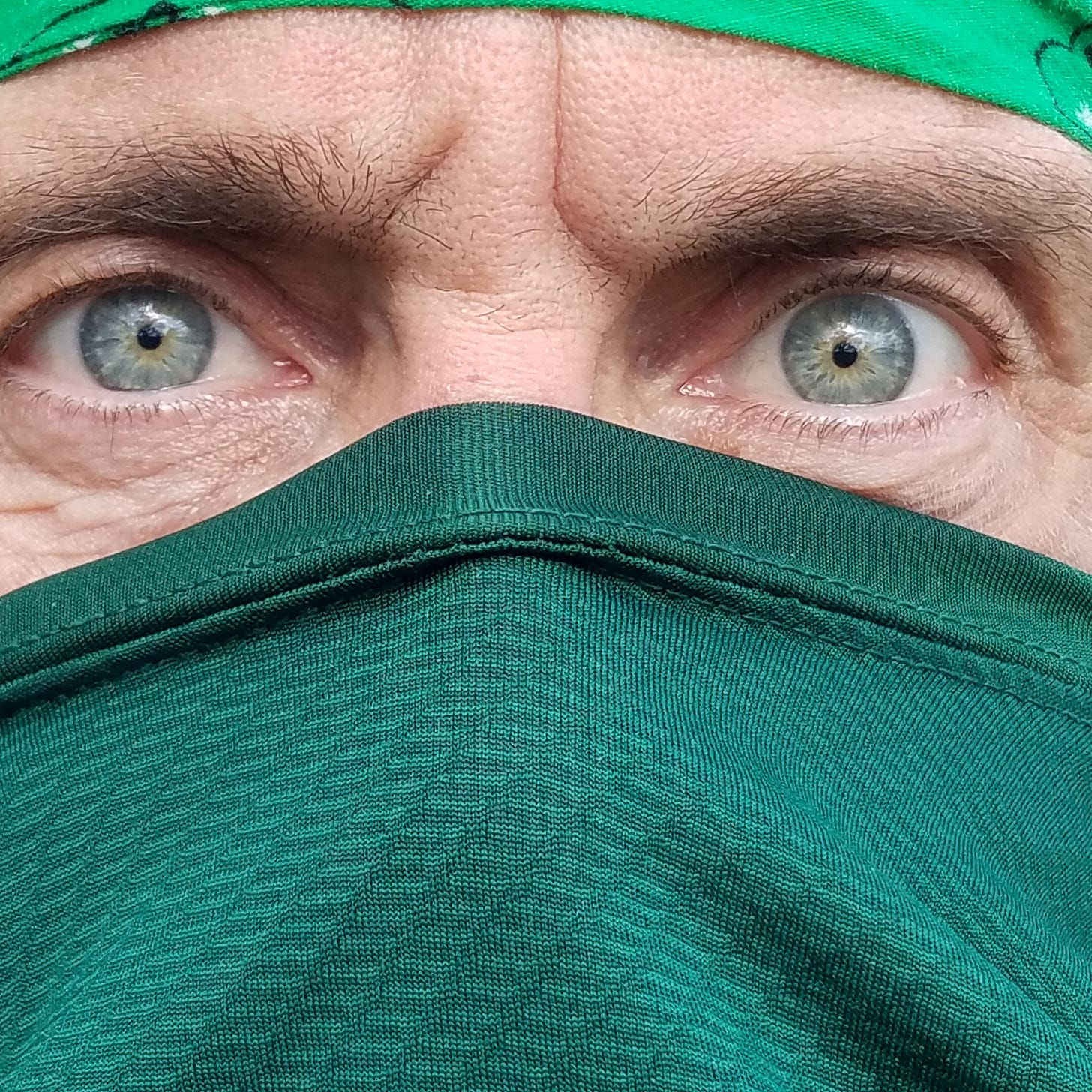Never Say “Never” - What Can, WILL happen
Gator SUMIT: Swamp Ugly to Mount Indomitable-Triumph (SUMIT) Program
Progressive and incremental emergency response planning and survival and disaster readiness, survival, and added value of outdoor life activities (i.e., hiking, camping skills training and orientation program, etc). The ultimate goal is to enable the best readiness rate for a significant disaster event and build the ability to tactically employ and practice the technical skills learned in a demanding environment.
They said I was crazy then, until Mr. Murphy B. Law made it happen.
Every day the catastrophes are increasing. Make sure your family/Small-Group-Unit (SGU) are prepared.
I predicted that there will be a dramatic increase in catastrophes which will be ever-increasingly violent to the end state/capstone event which seems designed to bring about a New World Order.
DO NOT allow the FPF (Family Pain Factor) to be high - when the emergency rescue system is overloaded, a thing we called Priority-of-Work or perhaps priority of no work will result in your SGU being stranded.
Maybe Not So Happy Campers, but Prudently Prepared: The task of conducting prudent emergency response planning may be laborious, especially if this is a new subject in which you have yet to gain any previous interest or experience. Like any subject, you must apply a commensurate level of time to develop the Skills, Knowledge, and Abilities (KSA’s) to make readiness easier while growing confidence and appreciation for outdoor activities.
Priority One: Life-saving water management includes the ability to capture, hold, sterilize, and manage water for consumption and maintenance of life support equipment. Rehearse Concepts of Survival Support (CoSS) to hold water (metal canteens to heat water, plastic canteens to hold water, foldable water bottles to expand water storage, water disinfection methods, ability to heat water, etc.). It does not have to be a Total-Catastrophic-Disaster (TCD).
Scenario-Driven Readiness: Many situations can turn into disasters quickly. Here are a few of my personal examples:
A near-death experience with the face-front terror of a tornado.
Sudden blizzard while climbing very high mountains.
Vehicle break-down on an Afghanistan road w/o radio or cell phone signal…complacency resulted in limited water, food, commo, etc. while stranded.
Massive unpredicted rainfall, creating a sudden wadi washing away a gorge during the night.
Traveling in the Dakotas with the onset of a blizzard blocking roads.
Caught in the deep woods while hunting with deep snow, darkness fell, and difficult navigation – all leading to a dangerous situation.
What examples can you guess are probable in your shear of life?
A sudden blizzard of 3 feet of snow blocked it for days.
Rain flood area knocking out power for days.
Traveling late in a major storm, and the roads are blocked by flooding, downed trees, power lines, etc.
Yes, I am busy too—sadly enslaved to a day-job—while we work towards our dreams at the top of Mount Success, life (time, space, money, assets, work) and the many competing priorities cause the what-ifs in life to take a back seat. The process of conducting prudent emergency planning for your family can be overwhelming. The question is not if to decide, but how to decide to move forward. It includes understanding the factors that go into assessing your current situation and applying the actions necessary to ensure your family is going to be best prepared to handle any situation. This forum is here to help you easily funnel your energy and resources and translate your end-state vision into action.
Gator Rapid Action Survival Plans (GRASP) the Gator Decision-Making Process (GDMP): This guide will help you rapidly prepare and execute specific alternatives. Summary of the GDMP, which includes the following variables:
Political, economic, social, information, infrastructure, physical environment, civil and military organizations proximity and jurisdiction.
Regardless of a global, national, or regional level disaster, ground zero is where you and your SGU are when disaster hits. We are subject to the risks in the probability of the occurrence of natural or man-made disasters.
Your preparation can help ensure you and your SGU are able to handle any situation.
Get FIT (physically, mentally and spiritually) to build resiliency to withstand any disaster.
Disasters come in all forms (i.e., hurricanes, tornados, blizzards, floods, tsunamis, earthquakes, volcanic eruptions, train accidents, chemical spills, nuclear, pandemics, wildfires, terrorism, violence, mass shootings, etc). Do not limit preparation.
Integrate emergency disaster planning everywhere you go and in everything you do—at home, on vacations, travel, and during mundane errands. No car should ever be without an emergency kit in the event of an individual mobile disaster. You will quickly find out how severe a situation can become in an emergency (e.g., sudden flooding, blizzards, vehicle malfunction, road closures, and even running out of gas), which can lead to life-threatening situations.
You must develop a concept as soon as possible to balance life, work, and major issues (i.e., pandemics) using available resources to enable the best preparedness level possible. In this program, I will give my best effort to provide you with advice and lessons learned on sustainment, communication, and survival requirements. Especially w/focus on those aspects of the E in the SHAPE stage (Equipment), the stage REAL (Rehearse, Educate, Assess, Logistics and Lessons), PLANS stage (Procedures, Leading, Actions, Needed, Survival).
Learning quickly, getting outdoors into the field, and practicing skills to help when real hardship is imposed due to an unpredictable event.
When considering resource needs, focus on the priorities of life-saving capabilities (short versus long-term). Once safety from an immediate threat is achieved, water is a critical life-saving resource. 392
Thereafter, the scenario and duration will drive other needs, such as food, shelter, etc.
Maximize the newest technologies to keep up with and compete with the demands of your ongoing livelihood, such as solar panels for power management, yet in the event of catastrophic losses, you will become less reliant on technology and building basic capabilities.
Hope this helps in your PREP FOR GOOD & SHAPE’ing REAL PLAN’s
• FREE ONLINE COURSE – Free eBook inside. Gator FERPS Workbook One (GFWB1) https://g3cacademy.com/courses/basic-survival-training/
• See the publications overview:




